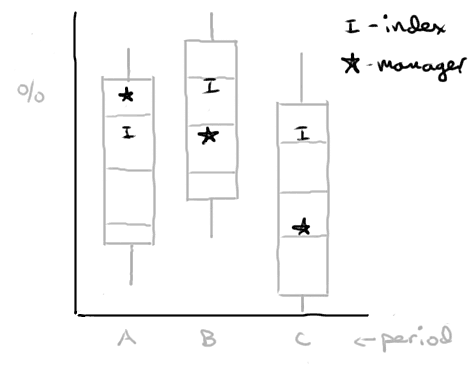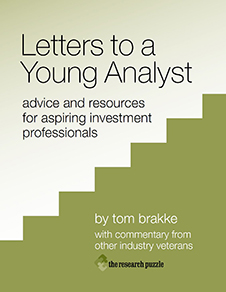
- Tuesday, June 1st, 2010
- everything is relative
-
Take a look at the chart below. What do you see? In structure, it is a simple boxplot, but for investment managers, it is much more than that. It is the mapping of a way of life.

The chart is certainly handy, portraying as it does the performance of a manager against an index and a peer group, across a number of time horizons, all in one fell swoop. But it is merely a snapshot of the “what,” devoid of the necessary examinations of “why” and “how”; nonetheless it carries inordinate weight in the selection of managers and therefore in the structure of the business.
We are wired to compare ourselves to others,the research puzzle | As I wrote about in “competitive yoga.” no matter the endeavor. I was asked a couple of weeks ago about my knowledge of the decisions made by the other independent consultants operating under the Global Research Analyst Settlement. Since we had met together during the formative stages of that endeavor, I was exposed to their ways of thinking and benefited from their knowledge, but I explained to my questioner that beyond that I did not review or analyze their work in any detail. My charge was to make independent choices within the parameters of the settlement order, not to do what others were doing.
He responded, “What about benchmarking and best practices?” The specific answer to that question always depends upon the circumstances, but resting your process on comparative measures too often serves as a cover for decision making and an anchor for behavior.
In the case of the settlement, I had extensive experience regarding the issues at hand. In addition, I researched thoroughly the areas where I lacked information, learned from my counterparts during our meetings with regulators, and did extensive due diligence on research providers. Why would I then look over my shoulder to see what others were doing when it came time to implement a solution? Isn’t my job to make the best decisions that I can and to be able to articulate why I made them?
As it should be for investment managers. Unfortunately, relative performance evaluation limits their willingness to venture from the pack, because career risk kicks in and if you are too far from your benchmarks or your competitive group at any time your job could be on the line. Message: Don’t stray too far. Do what others do.
To complicate things further, it’s easy to fall into the trap of equating “best practices” with “best performance” over some period, despite ample evidence that “worst practices” can generate it sometimes too. While the system inhibits would-be pioneers, there are those intrepid souls that venture forth, and the ones that deliver performance for a time are soon followed by others riding hard to catch up, not too concerned about where they are going or what they are doing, just that they are behind. They may arrive alongside just in time for an ambush of sorts.
In an earlier piece I wrote, “When everything is relative, it’s easy to lose situational awareness.”the research puzzle | The title, “situational awareness,” comes from a famous airline incident. In large part, that’s what has happened to the investment management industry of today, to the sellers of those services as well as to the buyers.
All of whom should read James Montier’s latest piece, “I Want to Break Free.”GMO LLC | The article is available following free registration at GMO’s site, where you can also find Jeremy Grantham’s indispensable commentaries. As he outlines, it is time to face the choice of whether to maintain and reinforce the pillars of investment faith and practice, or to systematically tear them down.
The simple chart above is a crude representation of one of those pillars. Ask yourself (and don’t wait for others to answer): Is the doctrine of relativity that it portrays creating a better industry or a worse one? If it is the latter, where do we go from here?
